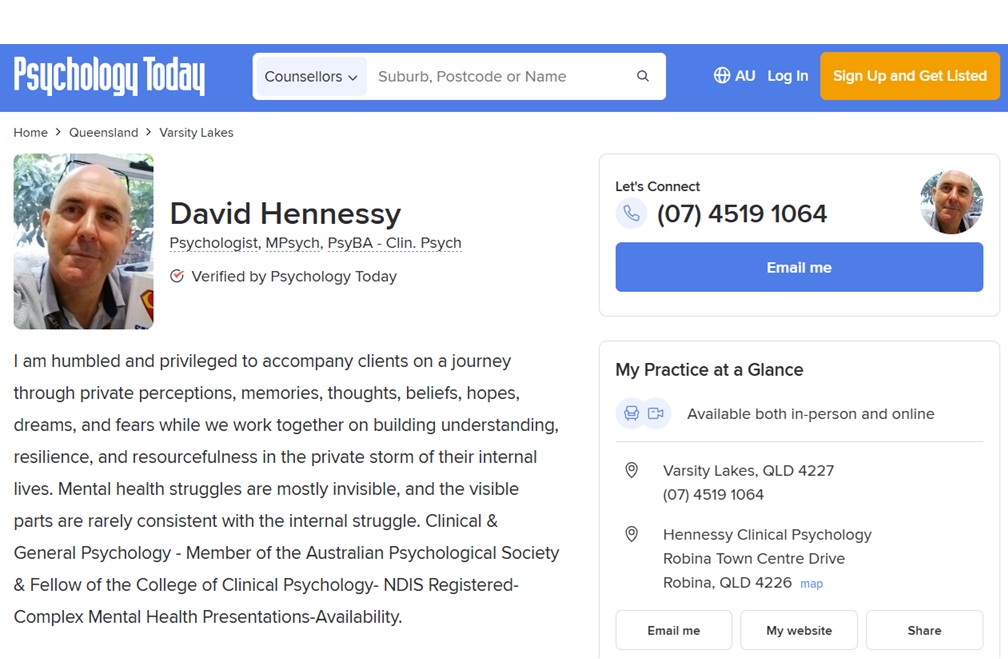David Hennessy, Clinical Psychologist, shares some ideas on how to choose the right psychologist for you.
The Puzzle of How to Choose the Right Psychologist

Choosing a Psychologist that is Right for you.
How do you choose the right psychologist for you? Psychologists differ in their type and level of qualifications, years and areas of experience, therapy type and style, as well as age and gender. All of these factors can play a role in choosing the right psychologist for you. But all of this is of limited value unless you feel comfortable and safe in the therapeutic relationship. The quality of the therapeutic relationship has been shown to be a robust predictor of positive outcomes (Norcross & Wampold, 2011; Wampold, 2015).
So how do you find someone who is experienced in what you need help with and will likely be a good fit for you?
Let’s walk through it together 💬
🧠 What is the difference between psychology and counselling?
While both psychologists and counsellors support people through emotional, behavioural, and mental health challenges, there are key differences in training, scope, and approach.
🔍 Psychologists are trained to assess, diagnose, and treat mental health conditions, often working with complex or chronic presentations.
💬 Counsellors tend to focus more on providing guidance, support, and practical strategies for coping with life stressors, transitions, or relationship issues.
👉 For a clear breakdown of the differences, check out this article by Deakin University.
🧠 What is the difference between a psychologist and a psychiatrist?
While both psychologists and psychiatrists help people with mental health challenges, their training and roles differ significantly.
🧠 Psychologists focus on understanding human behaviour and emotions, providing talk therapy and evidence-based psychological treatment. They do not prescribe medication.
💊 Psychiatrists are medical doctors who specialise in mental health. They can diagnose mental health conditions, prescribe medication, and often work closely with psychologists and GPs for integrated care.
👉 For more detail, Healthdirect Australia has a helpful guide that explains these roles side by side.
🧠 What is the difference between a clinical psychologist and a general psychologist?
Both clinical and general psychologists are registered professionals, but their training and areas of focus differ.
🎓 Clinical psychologists have advanced postgraduate training (typically a Master’s or Doctorate) in diagnosing and treating complex mental health conditions. They are endorsed by AHPRA in the area of clinical psychology and often work with more severe or long-term issues.
🧩 General psychologists are also fully registered and may work across a wide range of mental health presentations, but without a formal area of practice endorsement. They may focus on short-term concerns, life transitions, stress, or less complex presentations.
👉 The Australian Clinical Psychology Association (ACPA) provides a helpful explanation of these roles.
A good place to start your quest to choose the right psychologist for you is with trusted directories like Psychology Today – Australia
Psychology Today – Australia can help you choose the right psychologist for you. You can filter your search by:
📍 Location
🧠 Specialties (e.g. trauma, ADHD, relationships)
⚧️ Gender of therapist
🛠️ Therapy types (e.g. CBT, EMDR, ACT)
🖥️ Availability, including online and after-hours options
Profiles include an “About” section, photos, and sometimes videos — all designed to help you get a feel for the psychologist’s personality, style, and approach before reaching out.
You’ll also find listings for counsellors, who may be a helpful option depending on the complexity of your needs.
Each profile gives a sense of the therapist’s style, training, and how they work. Think of it as browsing profiles for someone you’ll be sharing your inner world with.
Example of a Psychology Today profile:
Click the image or visit David Hennessy’s Psychology Today profile to see a real-world example of what a profile can tell you — from therapeutic style and availability to professional background and practice locations.

📞 Book a consult or call to ask questions to assist your choice of psychologist.
Don’t be afraid to reach out and ask:
“Have you worked with someone like me before?”
“What’s your therapy approach?”
“Do you think we’d be a good fit?”
Most psychologists will gladly answer these questions — we genuinely want you to find someone who fits, even if it’s not us.
💬 Final thoughts
Finding the right psychologist is like choosing a guide for a deeply personal, sometimes challenging, but ultimately transformative journey. Don’t rush it. Trust your gut. And don’t be afraid to explore a few options before deciding.
If you’d like to see whether Hennessy Clinical Psychology could be a good fit, reach out. We’re here to help.
📬 Contact Hennessy Clinical Psychology
There is always a path forward. You’re not alone in your quest to choose the right psychologist for you
There is always a path forward. You’re not alone in your quest to choose the right psychologist for you

📚 Reference List
- ACPA (2024). What is a Clinical Psychologist? Australian Clinical Psychology Association. https://acpa.org.au/Web/Web/CP/What-is-a-Clinical-Psychologist.aspx
- Norcross, J. C., & Wampold, B. E. (2011). Evidence-based therapy relationships: Research conclusions and clinical practices. Psychotherapy, 48(1), 98–102. https://psycnet.apa.org/record/2011-08022-004
- Wampold, B. E. (2015). How important are the common factors in psychotherapy? World Psychiatry, 14(3), 270–277. https://doi.org/10.1037/a0037029
